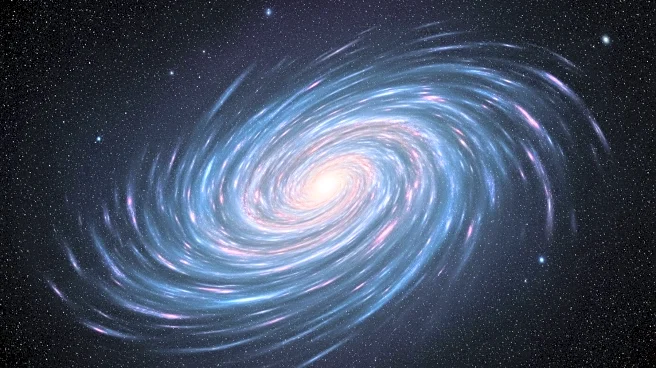What is the story about?
What's Happening?
In May 2019, a brief gravitational signal, known as GW190521, was detected by the LIGO and Virgo observatories. Unlike typical signals from black hole mergers, this signal was abrupt and lasted only a tenth of a second. Initially thought to be the result of two black holes merging, recent discussions led by physicist Qi Lai propose that it might be a gravitational echo from a collapsing wormhole. This theory challenges existing understandings of space-time and could verify speculative predictions of general relativity. Wormholes, theoretical structures proposed by Albert Einstein and Nathan Rosen, are thought to connect distant regions of space-time, but their existence remains speculative due to their predicted instability.
Why It's Important?
The potential discovery of a wormhole could revolutionize modern cosmology and our understanding of general relativity. If wormholes exist, they might serve as shortcuts through space-time, linking distant regions or even parallel universes. This would challenge the traditional view of isolated cosmic bodies and suggest a universe interwoven with space-time tunnels. The implications for time travel are significant, as stable wormholes could theoretically allow for communication between different moments in time, raising questions about causality. Such a discovery would not only transform our understanding of the universe but also open new frontiers in space and time exploration.
What's Next?
As researchers continue to analyze the GW190521 signal, the focus will be on further developing gravitational wave research to gain clearer insights into these phenomena. Future advancements in observatories could provide more definitive evidence of wormholes. The scientific community will likely engage in ongoing exploration of gravitational waves, which promises to deepen our understanding of space-time and potentially confirm the existence of wormholes. These efforts may ultimately reshape our view of the universe and our place within it.
Beyond the Headlines
The potential existence of wormholes raises profound questions about the nature of the universe and our understanding of reality. If confirmed, wormholes could alter the foundations of cosmology, suggesting a universe connected by theoretical passages. This discovery would challenge current scientific paradigms and open new avenues for exploring the mysteries of the cosmos. The implications for time travel and causality could lead to a reevaluation of our perception of time and space, fueling further scientific inquiry and debate.















